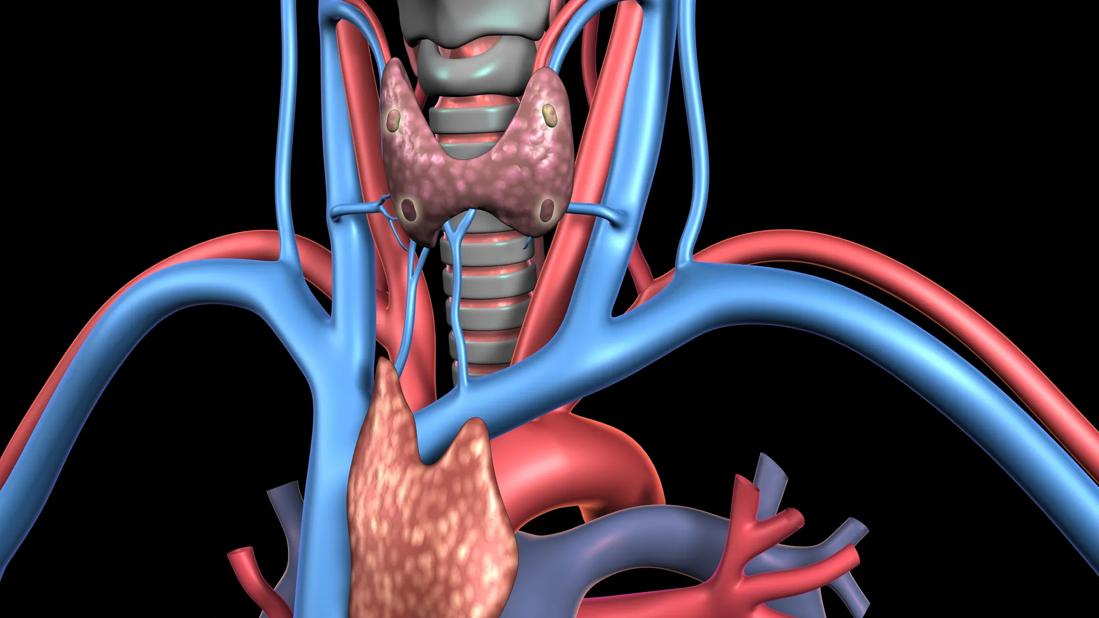New tool may complement workup and treatment of parathyroid and thyroid patients

Image content: This image is available to view online.
View image online (https://assets.clevelandclinic.org/transform/a9c8268f-a354-4d2f-bc8c-660af6ca5ccb/thyroid-parathyroid-and-thymus-gland-jpg)
Thyroid disease
Nuances in endocrine conditions create ample opportunity for the development of useful tools to help practitioners better understand patient perceptions of symptoms. A new study validates the Patient-Reported Outcomes Measurement for Parathyroid and Thyroid Disease (PROMPT). PROMPT is the first validated patient-reported outcomes measure that can be applied to symptoms of both hyperparathyroidism and thyroid enlargements.
Advertisement
Cleveland Clinic is a non-profit academic medical center. Advertising on our site helps support our mission. We do not endorse non-Cleveland Clinic products or services. Policy
“This is a relatively new area of active study, and it really puts things in a patient’s perspective,” notes Allan Siperstein, MD, Chairman of Cleveland Clinic’s Endocrine Surgery Department. “When we evaluate outcomes as physicians, we’re very much focused on what the imaging and labs look like. If, for example, the calcium level returns to normal after parathyroid surgery. Patients are much less interested in their lab values. What matters to them is: do they feel better after surgery?”
Using a validated tool like PROMPT would give surgeons greater surety when discussing potential surgical outcomes. “We would be able to tell them, in a more quantifiable way, what the expectation for improvement is,” says Dr. Siperstein.
Hyperparathyroidism is characterized by an overproduction of parathyroid hormone from one or more the body’s four parathyroid glands. This overproduction can lead to a variety of issues, including osteitis fibrosa cystica, nephrocalcinosis, peptic ulcer disease and proximal myopathy. Neuropsychiatric symptoms can be more subtle. These include bone pain, fatigue, depressed mood, irritability, anxiety and trouble concentrating.
“People might write off their symptoms as: ‘I’m not getting enough exercise, not eating right, not getting enough sleep,’ or ‘this is just the way I am.’ But these symptoms tend to come on slowly over a period of time,” says Dr. Siperstein. “With hyperparathyroidism, we may think the patient has fairly benign and subjective symptoms, but over time, the risk of developing decreased bone density, fractures and kidney stones stack up.”
Advertisement
“Many patients may have a mildly elevated calcium level, and come in with a number of what we call non-specific symptoms, such as weakness, fatigue or muscular-skeletal aches. Also, they may experience a very interesting type of mental confusion, which patients frequently refer to as brain fog. They just feel that the gears are not engaged in the way they normally are. Familiar situations may seem unfamiliar to them. When required to focus on a task, there tends to be almost a second-by-second distractibility. Some think they are developing early dementia, but that is a very different process. The difficulty has always been: can we measure these symptoms before surgery and demonstrate improvement afterward?”
PROMPT is a 30-question patient survey: 20 questions related to hyperparathyroidism, including fatigue, sleep, mood, mental clarity and body aches; and 10 questions that evaluate the compressive symptoms of thyroid enlargement. The survey was designed to be completed by patients in less than 10 minutes, while waiting for an appointment with an endocrine surgeon.
In this preliminary study, physicians developed PROMPT, and evaluated its internal validity and reliability in 235 patients over 10 months. Results indicate high reliability for both compressive and hyperparathyroidism constructs. Analysis also revealed the survey has high discriminant validity. Using the compressive score, PROMPT differentiates between goiter, thyroid nodule and hyperparathyroid patients.
The PROMPT survey may be useful in evaluating initial responsiveness to surgery, although further research is needed.
Advertisement
“We collected enough data to show, very preliminarily, that, in the parathyroid patients, there was symptomatic improvement after their surgery in the questions that related to parathyroid disease, but not necessarily in relation to the thyroid-related questions,” Dr. Siperstein states. “In the ensuing months, we’ve been collecting more follow-up data. Based on initial analysis, I am very surprised by how cleanly it fractured out for these patients after surgery.”
With high internal consistency and test-retest reliability, PROMPT may complement the workup and treatment of thyroid and parathyroid conditions.
“If we can show a clinical advantage to the patient from a very minimal procedure to correct parathyroid or thyroid disease, we hope that it may increase recognition of the disease and referral for surgical treatment.”
Advertisement
Advertisement
Pheochromocytoma case underscores the value in considering atypical presentations
Advocacy group underscores need for multidisciplinary expertise
A reconcilable divorce
A review of the latest evidence about purported side effects
High-volume surgery center can make a difference
Advancements in equipment and technology drive the use of HCL therapy for pregnant women with T1D
Patients spent less time in the hospital and no tumors were missed
A new study shows that an AI-enabled bundled system of sensors and coaching reduced A1C with fewer medications